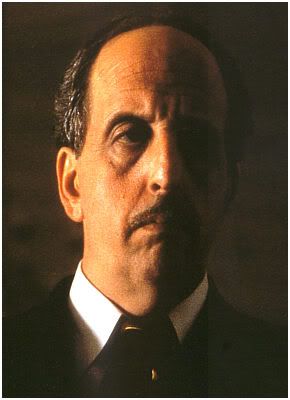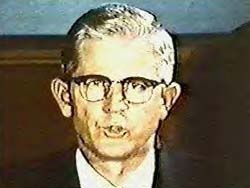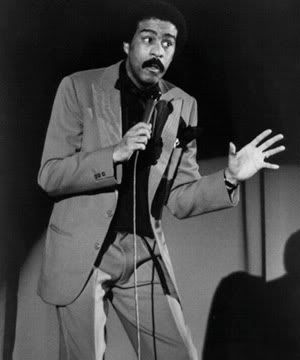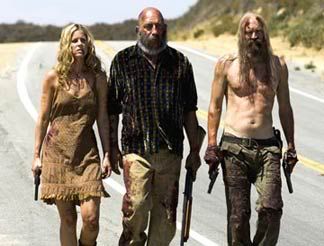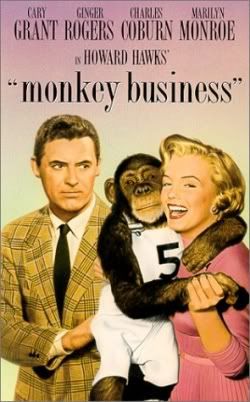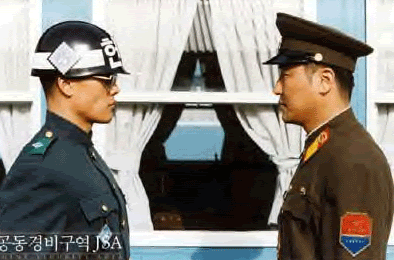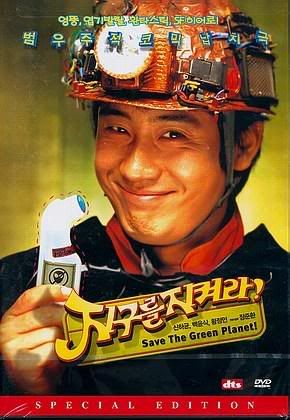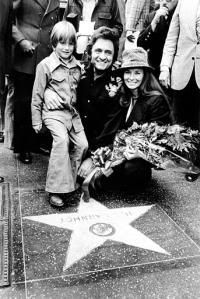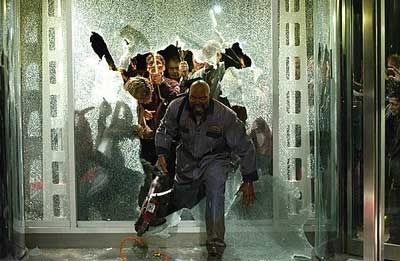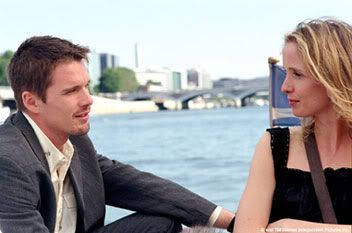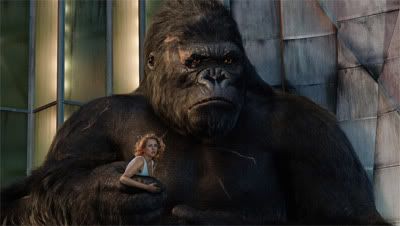
I'm pleased to report that Peter Jackson has done it again.
King Kong is, in plain and simple English, a wholly incredible motion picture experience. It might very well be the most amazing thing I've witnessed on a cinema screen in my life. And for bringing it to the screen, Mr. Jackson deserves a trillion dollars, a Lifetime Achievement Award from the Academy, and an invitation to go and live in the Playboy Mansion for the rest of his days. The man is literally a hero.
In many ways, this film actually out-does the original. It sounds as impossible to me as it no doubt will to you, but it's true. It's like the flower of the seeds planted by the 1933 film. It's a well-known fact that Jackson adores the original, but his
Kong is no mere Tarantino or Rob Zombie homage piece. Like Leone's
Once Upon a Time in the West , it knows its source material like the back of its hand, but creates a new world for it unlike anything seen before. The story is fleshed out, the characters are more like people than the archetypes of the original, and the special effects - just like Willis O'Brien's were in 1933 - are the best to be seen in the history of the cinema.
The fleshing-out of the characters involves a little more delving into the back-stories of all the protagonists. Carl Denham, played expertly by Jack Black, is a charismatic and mischievous showman but also an obsessive when it comes to filmmaking. He reminds us of Orson Welles, and maybe even a tiny bit of Werner Herzog. Adrian Brody's Jack Driscoll has been changed from the gruff sailor played by Bruce Cabot to a lanky, non-traditionally heroic playwright. And Anne Darrow, played beautifully by Naomi Watts, is simply incredible. I've heard a lot of complaints regarding the first third, that it takes too long to get going before we get to the Island. I disagree; I found that I was perfectly happy to spend the first hour getting to know the crew of the Venture. No, none of them are Hamlet, but they served the story well, and the impact was all the more powerful when it finally happened. I also enjoyed the little homage to the original, as Ann and her matinee idol co-star Bruce Baxter re-create the "women can't help being a nuisance" scene for Denham's camera.
After a turmulous storm, the
Venture arrives on Skull Island, and Denham and his film crew set out to explore the beach. In the seemingly deserted village, seperated from the rest of the island by a massive wall, they have a gnarly run-in with the natives, who are some of the scariest indiginous people ever committed to film. A far cry from the charmingly cheesy savages in the original, these islanders are the stuff of pure nightmares, a cross between the tribesmen in
Cannibal Holocaust and the Uruk-Hai out of
Lord of the Rings. The crew escapes after losing two of their members, but Anne is captured later that night and offered as a sacrifice to their god, the Mighty Kong.
The jungle of Skull Island appears like a three-dimensionalized version of that of the original. It's not like any real forest you've ever seen, it's an exaggerated, larger-than-life, other-worldly place. Peter Jackson subjects the crew to the whole shebang. Stampeding brontosauruses that crash and collide into one another like the elephants out of
Dumbo. A bottomless gorge filled with giant bugs, car-sized spiders, and horrific slug-beasts.
Battling fucking tyrannousauruses. It's truly incredible to see, even if a few of the set-ups run on a little long: as opposed to the nay-sayers who complained about the beginning being boring, I'd rather have shortened a handful of the dinosaur battles, and possibly even eliminated the spider pit sequence entirely (It'd have made a fine thing to look forward to on the Extended DVD). These are really rather small complaints, though - if anything, it's a case of too much of a good thing, but it's not really a big deal. Jackson's enthusiasm is infectuous; he directs movies like a little kid who eagerly wants to share his toys with you. We're more than happy to accept, even if that is one big fuckin' train set.
The jungle scenes shift back and forth between adrenaline-pumping, dinosaur-induced mayhem and the majestic titular character, who looks
amazing. Moreover, he looks
exactly like a real gorilla. Sporting scars around his face, matted fur, and a little bit of a gut, it's obvious that Kong is getting on in his years, and has been in punch-ups with carnivorous dinosaurs more than once before in his life. To watch him open a can of whoop-ass on three T-Rexes at once is jaw-dropping, and thanks to the WETA team and Any Serkis (who provided Kong's movements an mannerisms as he did for Gollum) the audience quickly sympathizes with him too. His relationship with Ann Darrow eliminates any of the potential creepiness of Fay Wray and Jessica Lange's suggested love affair with the giant ape; in this film, Kong seems to see himself almost as her protector, as if she were a baby to defend against dinosaurs, as well as her own species. Their relationship is one of mutual respect, and Watts does a beautiful job of of relating to the gorilla, doubling our sympathy for him as well as for her. When Ann performs some of her old vaudeville steps to make him laugh, and then settles down in his paw to watch the sunset from his mountain cave - trust me, it sounds ridiculous on paper, but on the screen, it works beautifully.
Again, I can't stress enough just how damn good Kong looks. I'm rarely impressed by CGI in films. I find great beauty in animatronic/puppet creations like the aliens in
Aliens and Yoda in
The Empire Strkes Back, and it goes without saying I adore the hand-rendered charm of the creations of Ray Harryhausen, but CGI rarely raises any kind of reaction from me other than "That right there is a special effect." One of the few films to blow me away with their computer-generated effects were Jackson's
Lord of the Rings films, and Kong even makes those look tame in comparison. I not only convinced that I was watching a real giant gorilla, but I really connected with him like I would with a real human actor, which, with the exception of Andy Serkis's other CGI-beastie, has never happened before.
Kong is taken back to New York the same way he was in the original - after knocking him unconscious Carl Denham proclaims "We're millionaires, boys! I'll share it with all of you! Why, in a few months his name will be up in lights on Broadway! Kong! The Eighth Wonder of the World!" and the next shot is a neon sign depicting just that. Denham schmoozes with rich society folk as they pack into his theater by the truckload, and when they finally settle in their seats, Kong is revealed. With his arms in chains and a group of dancers made up as natives surrounding him (another lovely homage to the original, complete with a piece of Max Steiner's score) Kong is heartbroken when he realizes that the blonde tied to the sacrificial altar in front of him is not his beloved Ann, so he breaks loose and tears the place to shreds. As he sends the patrons scattering for their lives, rips apart the decor, and crashes out into the street, frantically picking up women when he realizes he can't find Ann, we are treated to more gorgeous effects from the boys at WETA, but this time we're really gripped by Kong's anger and desperation.
When Kong and Ann finally meet up again, they share a few brief, quiet moments before the army catches up to them. They're on the run again, and the ascent up to the top of the Empire State Building is one of the most incredible I've seen in my life. It's exhilirating, thrilling, and utterly heart-breaking. Everyone knows how it's going to end, but it rips you apart all the same.
King Kong reminds us again why movies exist. A big hand to the masterful Peter Jackson for bringing this to the screen.
If there was anything that really bothered me about
King Kong it was nothing to do with what took place onscreen, but around me in the theater. There were three kids, about eight years old. They did not appear to have anyone watching them, and they were babbling REAL loud throughout, moving from aisle to aisle, drumming on overturned popcorn buckets, and generally just pissing me off real good. At one point, my dad points at the ringleader and says to him, in his scariest Hannibal Lecter-esque English accent, "If you and your friends don't shut the FUCK up, I'm going to have you thrown out of the theater." The little buggers still kept it up. I can understand that some children may have short attention spans when it comes to a three-hour film, but this started before they had even gotten on the boat. If I ever have kids, I think I'll make them watch
Lawrence of Arabia at the age of four, and if they ever say anything I'll punch 'em in the face.
